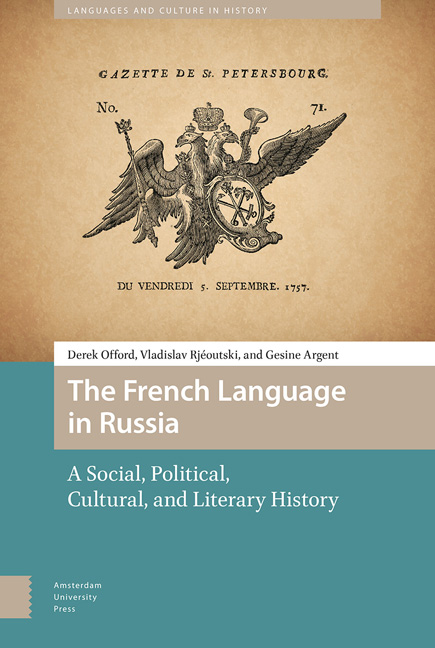Book contents
- Frontmatter
- Contents
- List of illustrations
- Preface
- Acknowledgements
- Presentation of Dates, Transliteration, and other Editorial Practices
- The Romanovs
- Introduction
- Chapter 1 The historical contexts of Russian francophonie
- Chapter 2 Teaching and learning French
- Chapter 3 French at court
- Chapter 4 French in high society
- Chapter 5 French in diplomacy and other official domains
- Chapter 6 Writing French
- Chapter 7 French for cultural propaganda and political polemics
- Chapter 8 Language attitudes
- Chapter 9 Perceptions of bilingualism in the classical Russian novel
- Conclusion The functions of French in imperial Russia
- Bibliography
- Index
- Languages and Culture in History
Chapter 6 - Writing French
Published online by Cambridge University Press: 16 February 2021
- Frontmatter
- Contents
- List of illustrations
- Preface
- Acknowledgements
- Presentation of Dates, Transliteration, and other Editorial Practices
- The Romanovs
- Introduction
- Chapter 1 The historical contexts of Russian francophonie
- Chapter 2 Teaching and learning French
- Chapter 3 French at court
- Chapter 4 French in high society
- Chapter 5 French in diplomacy and other official domains
- Chapter 6 Writing French
- Chapter 7 French for cultural propaganda and political polemics
- Chapter 8 Language attitudes
- Chapter 9 Perceptions of bilingualism in the classical Russian novel
- Conclusion The functions of French in imperial Russia
- Bibliography
- Index
- Languages and Culture in History
Summary
Types of text and language choice in them
Cultural production in languages other than the writer's mother tongue, Peter Barta and Phil Powrie have pointed out, has become increasingly widespread in the late twentieth and early twenty-first centuries, as the ‘fall of the Iron Curtain and ever-greater mobility across borders during the postcolonial period have brought cultures into contact and languages into productive frictions’. The phenomenon of bicultural writing, though, is by no means new in western civilization, as Barta and Powrie emphasize, and in this and the following chapter we examine a major historical manifestation of it, namely Russians’ use of French as a written language in the eighteenth and nineteenth centuries. The corpus of extant texts on which we may draw for this purpose is very extensive, so that we cannot do more in this book than classify the types of text found within the corpus and discuss some characteristic or particularly well-known examples. The corpus has many elements. It contains a mass of informal correspondence about personal and practical matters. It includes what might be called ‘literature’ in the broad sense of the term, that is to say elegant writing, or belles-lettres, and this capacious element itself consists of many different sorts of text: ego-writing, poems, drama, fiction, and discourse on moral, aesthetic, philosophical, and other matters. It also comprises texts in which the writer's purpose is persuasion, that is to say texts that are in some way propagandistic, polemical, or political, including texts that speculate on national destiny.
It will be useful, as we approach texts produced by Russians in French, or partly in French, to frame a question of the sort famously asked by Joshua Fishman about language use in a multilingual setting: who uses which language in what type of text, for what purpose, and at what stage in the historical period we examine? It will help us, moreover, to address this question and to understand the reasons why writers chose one language or another for particular texts, if we bear in mind the ways in which various kinds of ‘literature’ were conceived at one time or another. In particular, we may identify three types of literature in which the language choice made by bilingual Russians was determined by quite different considerations.
- Type
- Chapter
- Information
- The French Language in RussiaA Social, Political, Cultural, and Literary History, pp. 327 - 394Publisher: Amsterdam University PressPrint publication year: 2018



